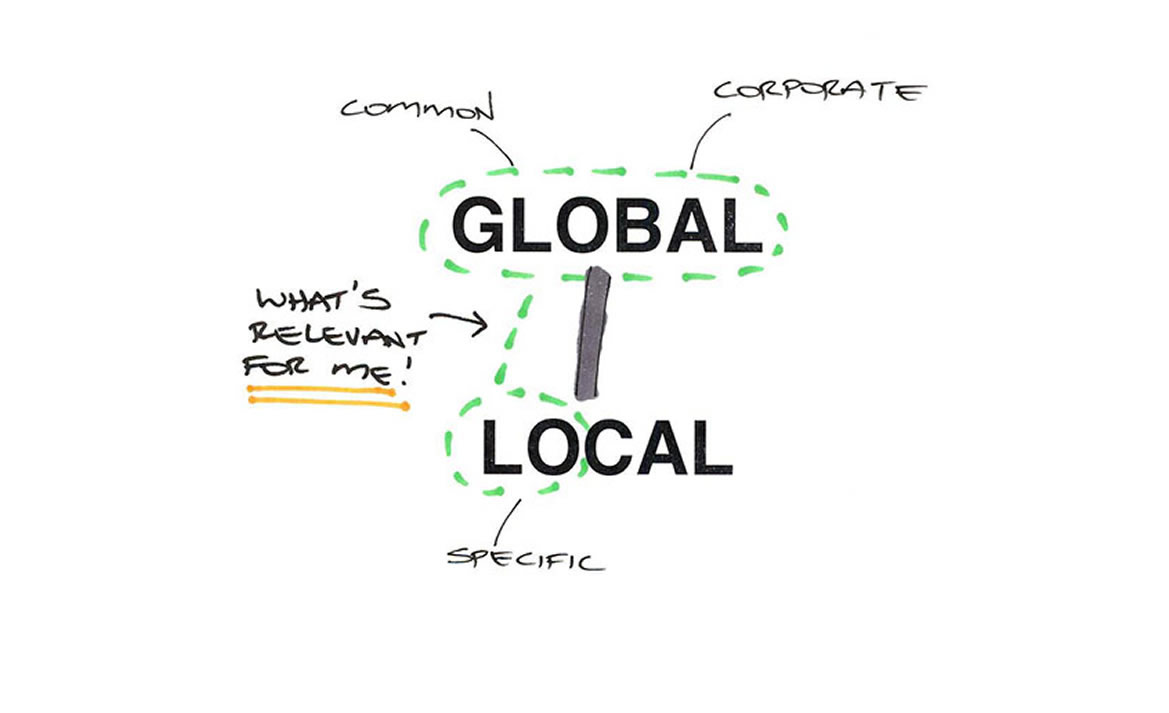Global to local

We work with a lot of large global organisations. For them it's all about scale. Scale, for them, can mean anything... from getting something live in a dozen markets (or region) through to deploying something in over a hundred markets.
Along this journey, we've picked up on a few hints and tips that we think help with the global to local challenges:
1. Get it right first time.
That means nail it with the global master version you are creating. This sounds really obvious but countless projects we have worked on, don't have the appropriate due diligence done upfront. The impact is then that mistakes or omissions are then repeated across countless markets. More often than not, this then ends up being a costly and embarrassing error to rectify. Classic mistakes of this type usually centre around meta tags for search (applies to virtually all content, not just digital) or the good old spelling mistakes and typos. Put gates in to prevent this and include it as part of the scope for internal and external partners throughout the project process.
2. Forewarned is forearmed
You will have an end 'customer' ...be it a HCP, a local marketing team or even an agency. Give them as much notice about what is coming and what you expect them to do. If all they need to do is translations, then let them know and do it way in advance. Give them options of translations services at a global level (we work with Translations.com) in case they don't have the resource or capability to translate locally. If they need to approve copy of content locally from a regulatory point of view, again give them plenty of notice on this. Local approval times are often out of the hands of local marketing teams and often sit with local government. Go beyond just giving them the due to date but tell them the context of this activity as part of a wider initiative. This can inform and, in some cases, determine how much attention, focus and resource they give it. It also helps them set the scene with their internal stakeholders and external approvers.
3. Do the hard work to make is simple for them.
Ok, I get it that it won't always be simple for them but the sentiment is right. It's a mantra we adopt at Pulse that we would rather get in early think: through the overall objective and then unlock ways to make it simple, faster and more cost effective to activate. All too often, we see the unintentional opposite happen where we end up trying to squeeze something that doesn't fit. The key for us is that technology needs to be the enabler here. If it is proving to be a 'disabler', then something is wrong.
4. Don't let perfection be your enemy
This might sound at odds with #1 but they shouldn't be mutually exclusive. In my view, speed and getting things to a minimum viable shippable state is key here. All too often, we are caught up in our internal processes, our internal stakeholders, and lose sight of what we are trying to do. Get a piece of content or an asset in front of a HCP, a patient or a consumer. Most of the time your end customer won't have a clue about the complexities you face but they will want to know why it's late or not there at all.
5. Test, Measure, Learn, Change.
Whilst this rule and principle should apply to anything we do here, it really comes to life when dealing with global to local. Having a test and measure framework in place, allows you to set the right KPI's. This then allows local markets to take your programme, assets or content and test them. By ensuring you have a continual feedback loop going back into your global teams, you can adapt future assets, tweak media recommendations or further optimise the activity through other means. Doing this successfully, and at scale, offers a clear competitive advantage.
If you are an organisation that operate over multiple markets and have challenges in the creation, localisation and deployment of assets, content or anything else for that matter, give us a call so we can share our experience and discover how we can help you overcome the challenges you face.